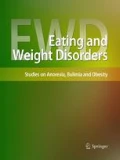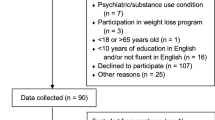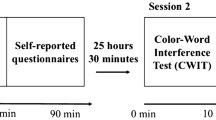Abstract
Food addiction (FA) has recently emerged as a new field in the study of obesity. Previous studies have contributed to identifying psychological correlates of FA. However, few researchers have examined the cognitive profile related to this condition; up until now, attentional biases related to food cues and a poorer performance monitoring have been observed. The present study aimed to examine the psychological profile and executive functioning related to FA in individuals with severe obesity and awaiting bariatric surgery. Participants (N = 86) were split into two groups, according to their level of FA symptoms (low FA vs high FA). Groups were compared on questionnaires measuring binge eating, depression and anxiety symptoms, and impulsivity as well as on measures reflecting executive functioning (D-KEFS and BRIEF-A). The relationship between FA groups and patterns of errors during the D-KEFS’ Color-Word Interference Test was further analyzed. Individuals within the high FA group reported significantly more binge eating, depressive and anxiety symptoms, and more metacognitive difficulties. They also tended to show a poorer inhibition/cognitive flexibility score and a typical pattern of errors, characterized by an increased number of errors as the tasks’ difficulty rose as opposed to a decreased number of errors, which characterizes an atypical pattern of errors. The present results show that the inability to learn from errors or past experiences is related to the severity of FA and overall impairments.
Level of evidence Level V, descriptive study.
Similar content being viewed by others
References
World Health Organization (2017) Obesity and overweight. http://www.who.int/mediacentre/factsheets/fs311/en/
Engin A (2017) The definition and prevalence of obesity and metabolic syndrome. Adv Exp Med Biol 960:1–17. https://doi.org/10.1007/978-3-319-48382-5_1
Gustafson DR, Rothenberg E, Blennow K, Steen B, Skoog I (2003) An 18-year follow-up of overweight and risk of Alzheimer disease. Arch Intern Med 163(13):1524–1528. https://doi.org/10.1001/archinte.163.13.1524
Hassing LB, Dahl AK, Thorvaldsson V, Berg S, Gatz M, Pedersen NL, Johansson B (2009) Overweight in midlife and risk for dementia: a 40-year follow-up study. Int J Obes (Lond) 33(8):893–898. https://doi.org/10.1038/ijo.2009.104
Hruby A, Manson JE, Qi L, Malik VS, Rimm EB, Sun Q et al (2016) Determinants and consequences of obesity. Am J Public Health 106(9):1656–1662. https://doi.org/10.2105/AJPH.2016.303326
Kivipelto M, Ngandu T, Fratiglioni L, Viitanen M, Kåreholt I, Winblad B et al (2005) Obesity and vascular risk factors at midlife and the risk of dementia and Alzheimer disease. Arch Neurol 62(10):1556–1560. https://doi.org/10.1001/archneur.62.10.1556
Whitmer RA, Gunderson EP, Quesenberry CP, Zhou J, Yaffe K (2007) Body mass index in midlife and risk of Alzheimer disease and vascular dementia. Curr Alzheimer Res 4(2):103–109. https://doi.org/10.2174/156720507780362047
Shriner R, Gold M (2014) Food addiction: an evolving nonlinear science. Nutrients 6(11):5370–5391. https://doi.org/10.3390/nu6115370
Marks R (2016) Is the failure to lose weight among the obese partly because obesity is an addictive disease?. Adv Obes Weight Manag Control 4(3):00086. https://doi.org/10.15406/aowmc.2015.04.00086
Von Deneen KM, Liu Y (2011) Obesity as an addiction: Why do the obese eat more?. Maturitas 68(4):342–345. https://doi.org/10.1016/j.maturitas.2011.01.018
Davis C, Carter JC (2009) Compulsive overeating as an addiction disorder. A review of theory and evidence. Appetite 53(1):1–8. https://doi.org/10.1016/j.appet.2009.05.018
Imperatori C, Fabbricatore M, Vumbaca V, Innamorati M, Contardi A, Farina B (2016) Food addiction: definition, measurement and prevalence in healthy subjects and in patients with eating disorders. Riv Psichiatr 51:60–65. https://doi.org/10.1708/2246.24196
Gearhardt AN, Corbin WR, Brownell KD (2009) Preliminary validation of the Yale Food Addiction Scale. Appetite 52(2):430–436. https://doi.org/10.1016/j.eatbeh.2013.07.002
American Psychiatric Association (2000) Diagnostic and statistical manual of mental disorders, 4th edn. American Psychiatric Association, Washington, DC (text revision)
Flint AJ, Gearhardt AN, Corbin WR, Brownell KD, Field AE, Rimm EB (2014) Food-addiction scale measurement in 2 cohorts of middle-aged older women. Am J Clin Nutr 99(3):578–586. https://doi.org/10.3945/ajcn.113.068965
Meule A, Lutz A, Vögele C, Kübler A (2012) Women with elevated food addiction symptoms show accelerated reactions, but no impaired inhibitory control, in response to pictures of high-calorie food-cues. Eat Behav 13(4):423–428. https://doi.org/10.1016/j.eatbeh.2012.08.001
Hardy R, Fani N, Jovanovic T et al (2018) Food addiction and substance addiction in women: common clinical characteristics. Appetite 120:367–373. https://doi.org/10.1016/j.appet.2017.09.026
Lent MR, Eichen DM, Goldbacher E, Wadden TA, Foster GD (2014) Relationship of food addiction to weight loss and attrition during obesity treatment. Obesity (Silver Spring) 22(1):52–55. https://doi.org/10.1002/oby.20512
Burmeister JM, Hinman N, Koball A, Hoffman DA, Carels RA (2013) Food addiction in adults seeking weight loss treatment. Implications for psychosocial health and weight loss. Appetite 60(1):103–110. https://doi.org/10.1016/j.appet.2012.09.013
Eichen DM, Lent MR, Goldbacher E, Foster GD (2013) Exploration of “Food Addiction” in overweight and obese treatment-seeking adults. Appetite 67:22. https://doi.org/10.1016/j.appet.2013.03.008
Davis C, Curtis C, Levitan RD, Carter JC, Kaplan AS, Kennedy JL (2011) Evidence that “food addiction” is a valid phenotype of obesity. Appetite 57(3):711–717. https://doi.org/10.1016/j.appet.2011.08.017
Ouellette A-S, Rodrigue C, Lemieux S, Tchernof A, Biertho L, Bégin C (2017) An examination of the mechanisms and personality traits underlying food addiction among individuals with severe obesity awaiting bariatric surgery. Eat Weight Disord 22(4):633–640. https://doi.org/10.1007/s40519-017-0440-7
Gearhardt AN, White MA, Masheb RM, Grilo CM (2013) An examination of food addiction in a racially diverse sample of obese patients with binge eating disorder in primary care settings. Compr Psychiatry 54(5):500–505. https://doi.org/10.1016/j.comppsych.2012.12.009
Clark SM, Saules KK (2013) Validation of the Yale Food Addiction Scale among a weight-loss surgery population. Eat Behav 14(2):216–219. https://doi.org/10.1016/j.eatbeh.2013.01.002
Meule A, Heckel D, Kübler A (2012) Factor structure and item analysis of the Yale Food Addiction Scale in obese candidates for bariatric surgery. Eur Eat Disord Rev 20(5):419–422. https://doi.org/10.1002/erv.2189
Brewerton TD (2017) Food addiction as a proxy for eating disorder and obesity severity, trauma history, PTSD symptoms, and comorbidity. Eat Weight Disord 22(2):241–247. https://doi.org/10.1007/s40519-016-0355-8
Ahmed AY, Sayed AM, Mostafa MK, Abdelaziz EA (2016) Food addiction relations to depression and anxiety in Egyptian adolescents. Egypt Pediatr Assoc Gaz 64(4):149–153. https://doi.org/10.1016/j.epag.2016.09.002
Pivarunas B, Conner BT (2015) Impulsivity and emotion dysregulation as predictors of food addiction. Eat Behav 19:9–14. https://doi.org/10.1016/j.eatbeh.2015.06.007
Wolz I, Granero R, Fernández-Aranda F (2017) A comprehensive model of food addiction in patients with binge-eating symptomatology: the essential role of negative urgency. Compr Psychiatry 74:118–124. https://doi.org/10.1016/j.comppsych.2017.01.012
Wolz I, Hilker I, Granero R, Jiménez-Murcia S, Gearhardt AN, Dieguez C et al (2016) “Food Addiction” in patients with eating disorders is associated with negative urgency and difficulties to focus on long-term goals. Front Psychol 7(61):1–10. https://doi.org/10.3389/fpsyg.2016.00061
Murphy CM, Stojek MK, Mackillop J (2014) Interrelationships among impulsive personality traits, food addiction, and Body Mass Index. Appetite 73:45–50. https://doi.org/10.1016/j.appet.2013.10.008
VanderBroek-Stice L, Stojek MK, Beach SRH, vanDellen MR, MacKillop J (2017) Multidimensional assessment of impulsivity in relation to obesity and food addiction. Appetite 112:59–68. https://doi.org/10.1016/j.appet.2017.01.009
Gearhardt AN, Yokum S, Orr PT, Stice E, Corbin WR, Brownell KD (2011) Neural correlates of food addiction. Arch Gen Psychiatry 68(8):808–816. https://doi.org/10.1001/archgenpsychiatry.2011.32
Imperatori C, Fabbricatore M, Innamorati M, Farina B, Quintiliani MI, Lamis DA et al (2015) Modification of EEG functional connectivity and EEG power spectra in overweight and obese patients with food addiction: An eLORETA study. Brain Imaging Behav 9(4):703–716. https://doi.org/10.1007/s11682-014-9324-x
Frayn M, Sears CR, von Ranson KM (2016) A sad mood increases attention to unhealthy food images in women with food addiction. Appetite 100:55–63. https://doi.org/10.1016/j.appet.2016.02.008
Franken IH, Nijs IMT, Toes A, Veen FM, van der Veen FM (2018) Food addiction is associated with impaired performance monitoring. Biol Psychol 131:49–53. https://doi.org/10.1016/j.biopsycho.2016.07.005
Delis DC. Kaplan E, Kramer JH (2001) The Delis-Kaplan executive function system: examiner’s manual. The Psychological Corporation, San Antonio
Ouellette A-S, Rodrigue C, Lemieux S, Tchernof A, Biertho L, Bégin C (2017) Yale Food Addiction Scale: examining the psychometric properties of the French version among Individuals with severe obesity awaiting bariatric surgery. Psychology 8(14):2547–2561. https://doi.org/10.4236/psych.2017.814161
Gormally J, Black S, Daston S, Rardin D (1982) The assessment of binge-eating severity among obese persons. Addict Behav 7(1):47–55
Beck AT, Steer RA, Brown GK (1996) BDI-II, Beck depression inventory: manual, 2d edn. The Psychological Corporation, San Antonio (TX)
Spielberger CD, Gorsuch RL, Lushene RE (1970) Manual for the state-trait anxiety inventory. Consulting Psychologist’s Press, Palo Alto
Patton JH, Stanford MS, Barratt ES (1995) Factor structure of the Barratt impulsiveness scale. J Clin Psychol 51(6):768–774. https://doi.org/10.1002/1097-4679(199511)51:6<768
Steinberg L, Sharp C, Stanford MS, Tharp AT (2013) New tricks for an old measure: the development of the Barratt Impulsiveness Scale–Brief (BIS-Brief). Psychol Assess 25(1):216–226. https://doi.org/10.1037/a0030550
Berg J, Swan NM, Banks SJ, Miller JB (2016) Atypical performance patterns on Delis–Kaplan executive functioning system Color–Word interference test: cognitive switching and learning ability in older adults. J Clin Exp Neuropsychol 38(7):745–751. https://doi.org/10.1080/13803395.2016.1161734
Lippa SM, Davis RN (2010) Inhibition/switching is not necessarily harder than inhibition: an analysis of the D-KEFS color-word interference test. Arch Clin Neuropsychol 25(2):146–152. https://doi.org/10.1093/arclin/acq001
Franken IH, van Strien JW, Franzek EJ, van de Wetering BJ (2007) Error-processing deficits in patients with cocaine dependence. Biol Psychol 75(1):45–51. https://doi.org/10.1016/j.biopsycho.2006.11.003
Roth RM, Isquith PK, Gioia GA (2005) BRIEF-A: Behavior Rating Inventory of Executive Function—adult Version: professional manual. Psychological Assessment Resources: Lutz, FL
Tabachnik BG, Fidell LS (2007) Using multivariate statistics, 5th edn. Pearson, New Yok
Ivezaj V, White MA, Grilo CM (2016) Examining binge-eating disorder and food addiction in adults with overweight and obesity. Obesity (Silver Spring) 24(10):2064–2069. https://doi.org/10.1002/oby.21607
Meule A (2012) Food addiction and body-mass-index: a non-linear relationship. Med Hypotheses 79(4):508–511. https://doi.org/10.1016/j.mehy.2012.07.005
Rothman KJ (2008) BMI-related errors in the measurement of obesity. Int J Obes (Lond) 32(Suppl 3):S56–S59. https://doi.org/10.1038/ijo.2008.87
Isquith PK, Roth RM, Gioia GA (2006) Behavior rating inventory of executive function—adult version. Psychological Assessment Resources, Florida
Noël X, Brevers D, Bechara A (2013) A neurocognitive approach to understanding the neurobiology of addiction. Curr Opin Neurobiol 23(4):632–638. https://doi.org/10.1016/j.conb.2013.01.018
Barkley RA (2012) Executive functions: what they are, how they work, and why they evolved. Guilford Press, New York
Damasio AR (1991) Toward a neurobiology of emotion and feeling: operational concepts and hypotheses. Neuroscientist 1(1):19–25. https://doi.org/10.1177/107385849500100104
Author information
Authors and Affiliations
Corresponding author
Ethics declarations
Conflict of interest
Dr. Tchernof as well as Dr. Biertho report grants from Johnson & Jonhson Medical Companies, outside the submitted work. The other authors declare no conflict of interest.
Ethical approval
All procedures performed in studies involving human participants were in accordance with the ethical standards of the institutional and/or national research committee and with the 1964 Helsinki declaration and its later amendments or comparable ethical standards.
Informed consent
Informed consent was obtained from all individual participants included in the study.
Additional information
This article is part of the topical collection on Food Addiction.
Rights and permissions
About this article
Cite this article
Rodrigue, C., Ouellette, AS., Lemieux, S. et al. Executive functioning and psychological symptoms in food addiction: a study among individuals with severe obesity. Eat Weight Disord 23, 469–478 (2018). https://doi.org/10.1007/s40519-018-0530-1
Received:
Accepted:
Published:
Issue Date:
DOI: https://doi.org/10.1007/s40519-018-0530-1




